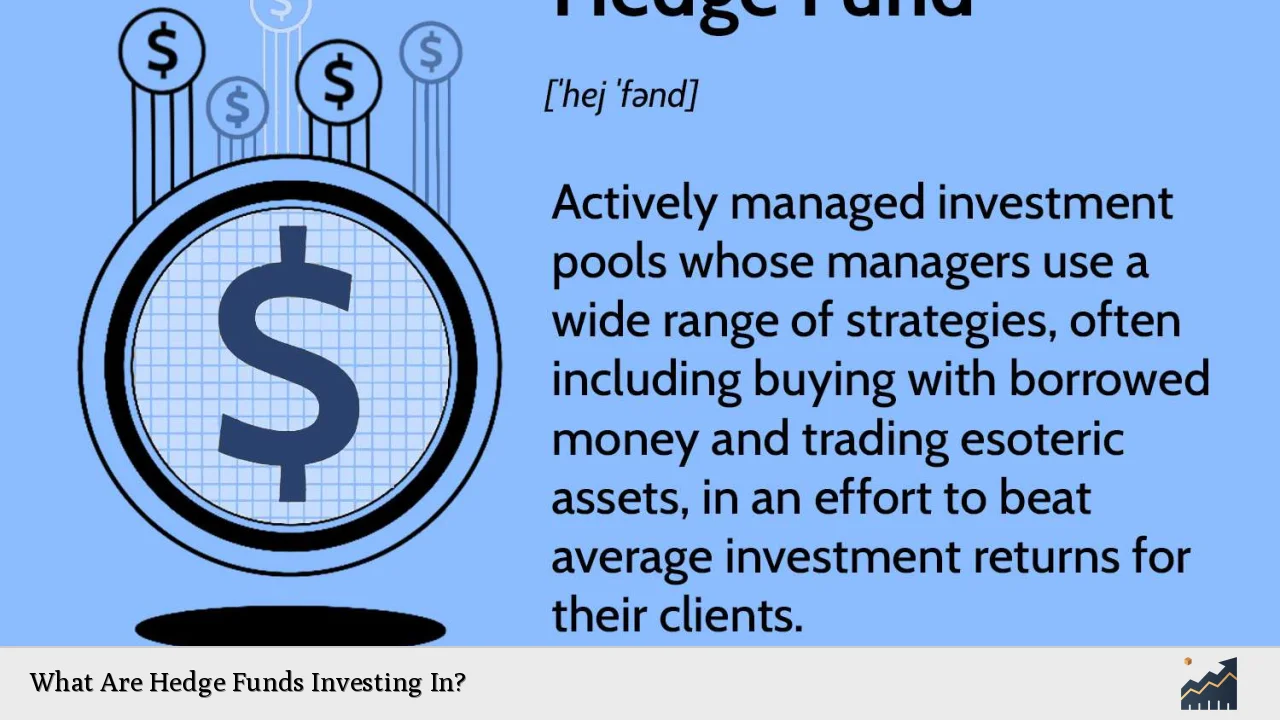Hedge funds are sophisticated investment vehicles that utilize various strategies to generate high returns for their investors. They typically invest in a wide range of assets, including equities, fixed income, commodities, currencies, and derivatives. The investment landscape for hedge funds is constantly evolving, influenced by market conditions, investor preferences, and regulatory changes. As we move into 2025, hedge funds are expected to focus on several key areas that reflect current economic trends and investor sentiment.
Hedge funds have gained renewed interest as traditional investment strategies face challenges due to market volatility and changing economic conditions. Many investors are now looking towards hedge funds as a means of diversification and potential alpha generation. This article explores the current trends in hedge fund investments, the strategies being employed, and the sectors attracting significant capital.
| Investment Focus | Description |
|---|---|
| Market Volatility | Hedge funds are focusing on exploiting increased market volatility for potential gains. |
| Reinsurance Strategies | There is a rising demand for hedge funds that specialize in reinsurance due to favorable pricing conditions. |
Key Investment Areas for Hedge Funds
Hedge funds are increasingly investing in areas that allow them to capitalize on market inefficiencies and volatility. Here are some of the primary sectors attracting hedge fund investments:
- Equity Markets: Many hedge funds continue to invest heavily in equities, particularly in sectors that show potential for growth or recovery. The recent performance of equity-focused hedge funds has been strong, with an average return of 12.75% in 2024.
- Fixed Income: With rising interest rates, hedge funds are exploring opportunities in fixed income markets. They are particularly interested in strategies that allow them to benefit from interest rate fluctuations.
- Reinsurance: There is a notable increase in interest towards reinsurance hedge fund managers. The pricing environment has improved significantly, making this sector attractive for investors seeking uncorrelated returns.
- Cryptocurrency and Blockchain: Hedge funds are also venturing into cryptocurrency investments and blockchain technologies. This area offers high-risk but potentially high-reward opportunities as the digital asset landscape continues to evolve.
- Environmental, Social, and Governance (ESG) Investments: While interest in ESG investing has fluctuated, some hedge funds are still focusing on sustainable investments as part of their portfolio strategy.
Strategies Employed by Hedge Funds
Hedge funds employ a variety of strategies to achieve their investment goals. Some of the most common strategies include:
- Long/Short Equity: This strategy involves buying undervalued stocks while short-selling overvalued ones. It allows managers to profit from both rising and falling markets.
- Event-Driven Strategies: These involve investing based on anticipated events such as mergers or acquisitions. Hedge funds analyze corporate actions to identify potential profit opportunities.
- Global Macro: This strategy focuses on global economic trends and involves taking positions in various asset classes based on macroeconomic forecasts.
- Multi-Strategy: Many hedge funds utilize a multi-strategy approach, combining various investment strategies to diversify risk and optimize returns.
- Quantitative Strategies: These rely on mathematical models and algorithms to identify trading opportunities. Data-driven approaches are becoming increasingly popular among hedge fund managers.
The Impact of Market Conditions
The current market environment significantly influences hedge fund investment strategies. With increasing volatility expected in 2025, skilled managers are likely to leverage this unpredictability to generate alpha through strategic security selection.
The anticipated rise in capital introduction events suggests that institutional investors will seek out managers capable of navigating complex market conditions effectively. Hedge funds that can adapt quickly to changing circumstances will likely outperform their peers.
Moreover, the relationship between interest rates and hedge fund performance is crucial. Higher interest rates can lead to enhanced returns on liquid assets and increased opportunities for short selling. As such, hedge funds are strategically positioning themselves to benefit from these dynamics.
Trends Shaping the Hedge Fund Industry
Several trends are emerging within the hedge fund industry that will shape investment strategies moving forward:
- Increased Focus on Smaller Managers: Investors are shifting towards smaller multi-strategy hedge funds that can offer more tailored approaches and better risk management compared to larger firms.
- Demand for Alternative Data: Hedge funds are increasingly utilizing alternative data sources such as social media sentiment and satellite imagery to inform their investment decisions. This trend reflects a growing emphasis on data analytics within the industry.
- Rise of Virtual Networking Events: As competition intensifies among hedge fund managers, there is a surge in virtual capital introduction events where institutional investors can connect with potential managers efficiently.
Conclusion
As we look ahead into 2025, the landscape for hedge fund investments is marked by both challenges and opportunities. With a focus on exploiting market volatility, adapting to changing economic conditions, and leveraging innovative data sources, hedge funds continue to be an attractive option for investors seeking diversification and potential high returns.
The evolving strategies employed by these funds reflect a dynamic financial environment where flexibility and adaptability are key. Investors must remain informed about these trends and consider how they can align their portfolios with the shifting priorities of the hedge fund industry.
FAQs About Hedge Funds Investing
- What types of assets do hedge funds typically invest in?
Hedge funds invest in a variety of assets including equities, fixed income, commodities, currencies, and derivatives. - How do hedge funds generate alpha?
Hedge funds generate alpha by employing various strategies that exploit market inefficiencies and volatility. - Why is there increased interest in reinsurance hedge fund managers?
The pricing environment for reinsurance has improved significantly, attracting investors seeking uncorrelated returns. - What role does market volatility play in hedge fund performance?
Increased market volatility provides opportunities for skilled managers to capitalize on price movements through strategic security selection. - How important is data analysis for modern hedge fund strategies?
Data analysis is crucial as many hedge funds leverage alternative data sources to inform their investment decisions.

